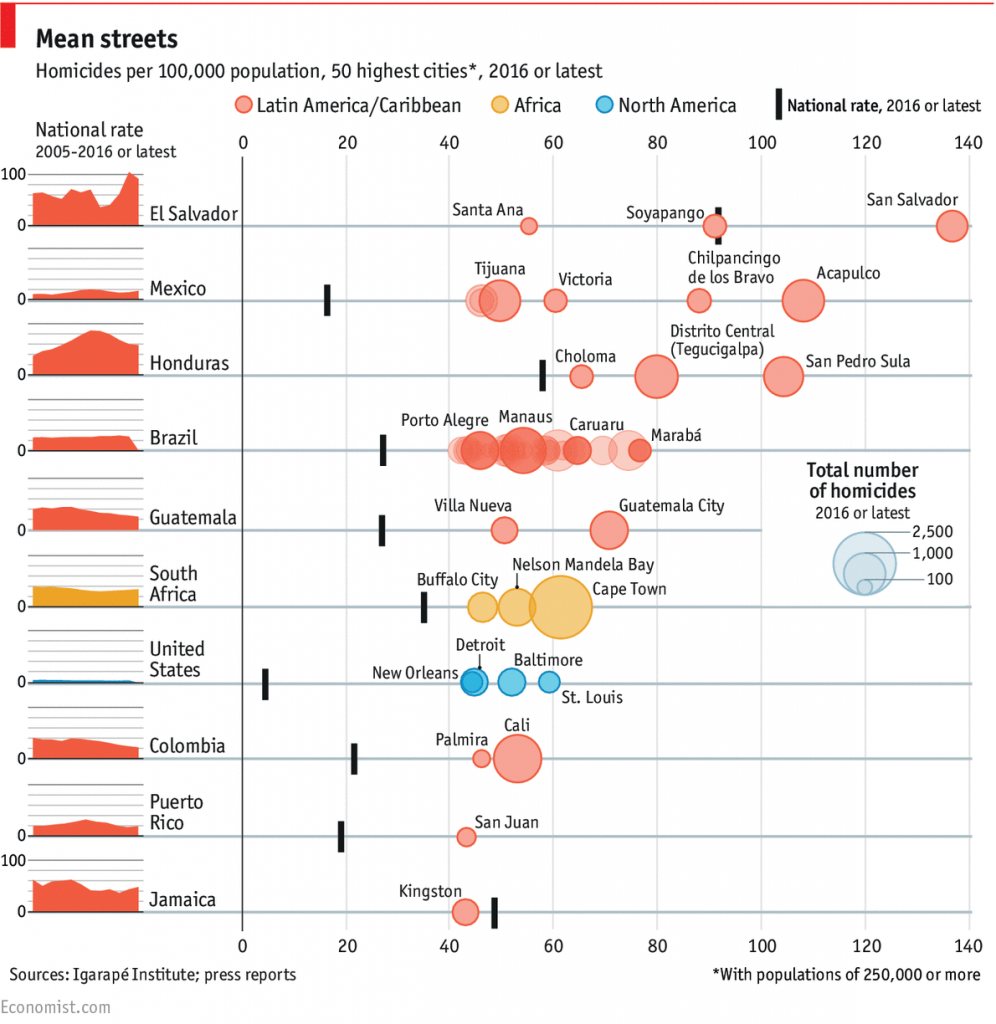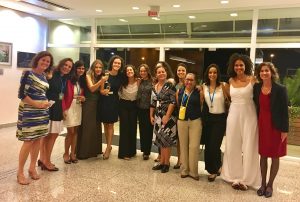
|
|
Newsletter nº 3 – March, 2017
|
 |
|
|
|
It’s time to reduce homicide in Latin America
Across Latin America, death stalks the young. Every 15 minutes, a young Latin American is murdered. This translates into roughly 400 killings a day, or 140,000 a year. In some countries, homicide is the number one cause of death for adolescent males, outpacing accidental injuries, cancer, suicide, and disease. More than 75 percent of the killings are committed with firearms, far above the global average.
Paradoxically, lethal violence has persisted in spite of impressive reductions in poverty and widespread improvements in education, health, and living standards. Making matters worse, Latin America’s homicide rate is exceedingly high at a time when murder is declining virtually everywhere else. The regional homicide rate is roughly 21 per 100,000 and is set to rise to 35 per 100,000 if conditions persist.
The Igarapé Institute joined The Economist magazine in March to review trends in murder across Latin American cities. It determined that 43 of the 50 most violent cities in the world were in the region. While fewer than last year, it is still alarming news. The story was covered by hundreds of media outlets around the world – including in Brazil, China, Colombia, Ecuador, El Salvador, Mexico, Russia, South Africa, Thailand, UK, the US and Vietnam. It builds on our partnership with The Economist in 2016.
The Igarapé Institute also produced a series of op-eds with Folha de S. Paulo on homicide reduction. In March and April the Institute published hard-hitting articles with the LA Times, USA Today,Foreign Affairs and Americas Quarterly (and here). These articles have helped shape a discussion across the region about targets and indicators to track lethal violence reduction.
The Igarapé Institute also kicked-off a campaign to reduce Latin American homicides by 50% in the next 10 years at the World Economic Forum’s regional summit in April. It was cited as one of the top highlights for WEF (similar to last year). The campaign is supported by the Organization for American States (OAS), the Latin American Development Bank (CAF), the Inter-American Development Bank (IADB), the Open Society Foundation (OSF) and has over 30 other non-governmental organizations from across the region as partners.
The launch of the campaign (called Instinto de Vida) generated a fair bit of debate across the region. It triggered conversations in El Tiempo, El Espectador (here andhere), World Economic Forum Agenda, América Economía, Spanish China, Xinhua Español, Devex, Panorama, El Día, Rimix Radio, La Voz and Diario Informe, among others.
Check out the Instinto de Vida campaign website – www.instintodevida.org – for more information on the campaign. We’d love to get you involved! Also connect to ourTwitter and Facebook pages. The Instinto de Vida coalition will hold national launches in Brazil, Colombia, El Salvador, Guatemala, Honduras, Mexico and Venezuela over the next two months. |
Igarapé in numbers – March, 2017
- The launch of the book “Drogas: as histórias que não te contaram“, written by our executive director, Ilona Szabó, with Brazilian journalist Isabel Clemente, had an enormous impact on the media and public opinion. With the launch on the 27th and 29th of March, outlets such as O Globo, Estadão, and Época echoed the need for a new Brazilian drug policy. The Supreme Federal Tribunal minister Luís Roberto Barroso alsopositioned himself for the decriminalization of drugs at a Fernando Henrique Cardoso Foundation event, supported by Igarapé. Totaling both events, over 600 people were present at the debates; the Sao Paulo launch was transmitted via streaming by FAAP TV.
- In March, Igarapé studies were cited 320 times in the international media, including in a report on arms in the magazine Caros Amigos, in an article on the issue of juvenile offenders in the Brazilian prison system in The Guardian, and in an overview on the crisis of war within the prison system in Brazil in Al Jazeera.
- 25 opinion articles were published by members of the Igarapé Institute team in March, which were reproduced and translated into various languages by outlets around the world, including an opinion article on the homicide epidemic in Latin America in Foreign Affairs as well as a piece on how to reduce the homicide rate in Latin America, and on the issue of Venezuelan immigrants in America’s Quarterly.
- The Igarapé Institute launched 3 new publications this month, addressing themes such as migration, gender and peacekeeping/security issues, and recommendations for the HIPPO report.
- Members of the Igarapé Institute were speakers and/or participants in 17 conferences and public events in March, including the expert workshop at the Development Bank of Latin America (CAF), Hacia Ciudades Más Seguras (Panama), and the launch of the 2016 Global Commission on Drug Policy report.
|
|
|

In Search of Gender Equality debates
The Igarapé Institute hosted an event – Challenges and Good Practices for Implementing the Women, Peace and Security Agenda – on 28-29 March in Brasilia. The two day event was supported by UN Women Brazil and the Canadian, Norwegian and UK embassies. It drew togetherresearchers from various institutions to discuss ways to implement Brazil´s newly minted National Action Plan on Women, Peace, and Security. Igarapé Institute was the only civil society representative involved in drafting the text. During the event the Igarapé also launched its latest publication on the issue – Em Busca da Igualdade de Gênero. |
|
|
|